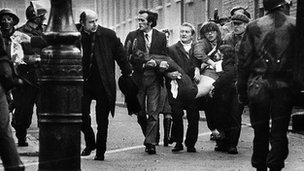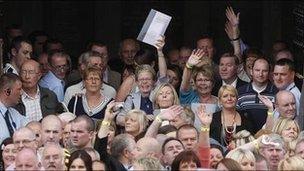Lord Saville: Bloody Sunday was Derry's 'most terrible day'
- Published
Lord Saville, who chaired the Bloody Sunday inquiry, has said the shootings were Londonderry's "most terrible day".
In a BBC interview he said his report seemed "to have achieved a lessening of tensions and possibly a degree of moving on".
He also defended the £195m cost of the 12-year inquiry, saying it would have been a "disaster" if not done properly.
On 30 January 1972, a civil rights march in Derry ended with the shooting dead of 13 people by the British army.
The Saville Report, published on 15 June 2010, was heavily critical of the Army and found that soldiers fired the first shot.
Speaking before Parliament, Prime Minister David Cameron said he was "deeply sorry" and that the findings of the report were "shocking".
A huge cheer erupted in Guildhall Square in Derry as Mr Cameron delivered the findings which unequivocally blamed the Army for one of the most controversial days in Northern Ireland's history.
Widgery Report
Lord Saville was appointed in 1998 by then Prime Minister Tony Blair to look into the events of Bloody Sunday.
It followed an earlier official inquiry in 1972, led by the Lord Chief Justice Lord Widgery, which was described as a "whitewash" by the families of the victims and their supporters.
Lord Saville said he had the impression that people in Derry were as upset by the Widgery Report as they have been by the events of the day.
"But, of course, whether they were right to be upset by the Widgery Report at the beginning we had no idea, because we had no preconceptions," he said.
"We started with a clean slate and on the evidence we received and the research we did, we came to the conclusions we did which differed from those of Lord Widgery."
"I'm happy with the reception the report received, but I must stress, we didn't write the report with a view to what reception it might receive.
"We wrote the report in an attempt to find out what had happened on Bloody Sunday.

The Saville Report was heavily critical of the Army and found that soldiers fired the first shot
"It does seem to have advanced the cause of peace of Northern Ireland."
While most of the families of those killed on Bloody Sunday welcomed the Saville Report, one has questioned its findings.
The inquiry found that one of the victims, 17-year-old Gerald Donaghey was probably armed with nail bombs when he was shot by Soldier G.
However, it went on to say that he was not preparing to throw them at the time when he was shot, nor was he shot because he was carrying them.
The Donaghey family have argued that the nail bombs were planted on Gerald.
Lord Saville said the inquiry had looked at the killing at "considerable length".
"The chapter on Gerald Donaghey and the nail bombs is more than 100 pages long, and it really came down to two possibilities," he said.
"We couldn't exclude the possibility that the nail bombs had been planted on him.
"But we came to the conclusion that the balance of probabilities of those two possibilities lay in the conclusion that he probably had the nail bombs on him when he was shot, not sure about it, but it was probably the case."
'Gratified and pleased'
Lord Saville was not in Derry on the day the report was published, he was writing up another judgement for the Supreme Court, but did watch some of the events in the city unfold on television.
"My counsel team did go over there and they told me it was one of the most emotional occasions they'd ever been to," he said.
"It did seem to get a good reception and the city that day did seem to be happy, so I was gratified and pleased.
"He (David Cameron) did adopt the absolutely correct response to a report of this kind and from what I saw on the television about the reception in Derry, he achieved a remarkable result.
"I never thought I would see an audience outside the Guildhall in Derry actually applaud a Conservative prime minister."

Familes emerge from the Guildhall in Derry on 15 June 2010 after receiving the Saville Report
On a role that took up so much of his life, Lord Saville said they were on a "search for the truth and we wanted everyone to help us find the truth if we possibly could".
"Christopher Clarke in his opening statement said: 'Not the truth as people would like it to be, but the truth pure and simple. However complex, painful or unacceptable to whom so ever that truth may be.'
"It was simply another, and by far the longest and biggest, judgement of my judicial career and as a judge you do your best to reach the answer you think is best and it's for others to judge whether you have done so or not.
"It was a job that I tried to do carefully.
"It took a lot of time, cost a lot of money, we received a lot of criticism for spending so much time and so much money, but we felt that had to be done in order to do not only a thorough job but also a fair job," he said.
More of the interview with Lord Saville can be seen on BBC Newsline in Northern Ireland at 31 January at 18:30 GMT.
- Published13 October 2010
- Published15 June 2010